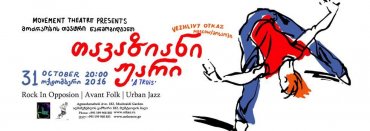October 31 - 20:00
On
the one hand, three is a magic number. Historical digressions and
religious analogies aside, consider, for one, the Russian tradition
of consuming not-really-nonalcoholic beverages. Four partakers is
too much, two is not enough, and only three can share in the sacred
meaning by emptying the glass vessel.
On the other hand, rock 'n’ roll has always favored the trio
format. Cream, Jimi Hendrix Experience, Blue Cheer, Thin Lizzy,
Stray Cats, The Jam—the list can go on and on. A trio is compact, a
trio is convenient: a singing guitarist, a bassist, and a drummer;
nothing in excess. And it’s a litmus test, too—any unspoken
awkwardness that a barrage of keyboards and, say, the brass section
can disguise gets thrust
out into the open.
To Vezhlivy Otkaz, however, a deliberate return to triunity (recall
that the band has had its stints of “compact” music-making—enter
the famed vinyl release of 1989 through the then-Soviet Melodia
gramophone record firm) is, at heart, a creative experiment as
well—akin to spiritual practice or even comparative anatomy. By
stripping the many layers of arrangements off the familiar tracks,
Roman Suslov (guitar, vocals), Mikhail Mitin (drums) and Dmitry
Shumilov (bass, backing vocals) reveal their skeleton, their
groundwork—and in the most incredible of ways the basis without any
superstructure whatsoever shines as a work of art all its
own.
What's more, there's no cherry-picking of repertoire with these “à
trois” performances in mind. This challenges the band members to
take a complex orchestral piece (most the Otkaz’s pieces of the
past two decades were written for a sextet) and then, as Auguste
Rodin would put it, “chop off whatever is not needed.” This
exercise impels the musicians to be even more demanding of the
precision and sound, says Roman Suslov.
Finally, listening to Vezhlivy Otkaz “à trois” makes it especially
clear why musical critics still diffidently pigeonhole this Moscow
band as “experimental art rock” and dare not offer other
definitions. What we have here is exactly that—a “circle of musical
studies,” as the musicians once self-defined, a hermetical one to a
degree but not opposed to being observed. And there's no purer
happiness to a drive lover than being part of these
observations.
Movement Theatre
Aghmashenebeli av. 182 / Mushtaidi Garden



